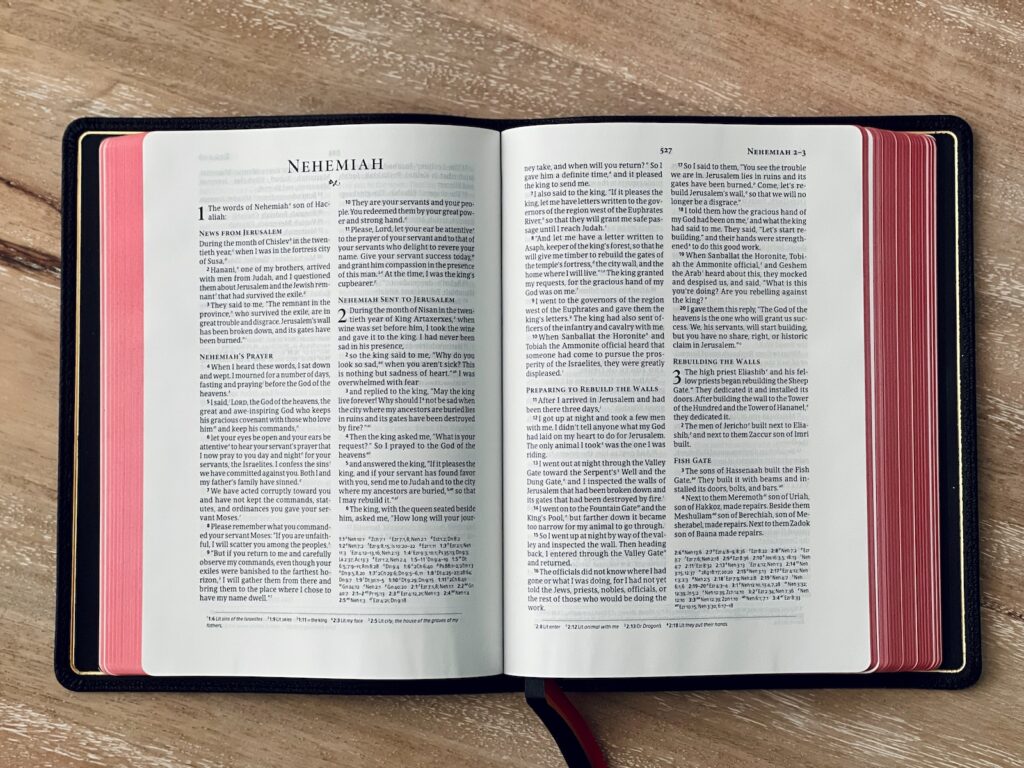

Nehemiah and Hanani were the sons of I Hachaliah (Neh. 1:1; 2:5; 7:2), and the references suggest that the family belonged to the capital. Nehemiah, although born in exile. grew up in the faith of Israel’s God. Nehemiah’s name appears as a prince, not as a priest (Neh. 9:38; 10:1), and he was perhaps the chief man who returned from Babylon with Zerubbabel (Ezra 2:2; Neh. 7:7). As the king’s cupbearer, he held a high place of honor in the palace of Shushan (Neh. 1:11), having confidential access to the king. His Persian name was Sheshbazzar (Ezra 1:8). He was one of the princes who signed the covenant (Neh. 9:38; 10:1). He became Governor of Jerusalem (Neh. 10:1). Josephus says that Nehemiah died of old age and that the repaired walls of the city constituted his best and most enduring monument.
For his patriotic task (Neh. 1:1-4), Nehemiah was well qualified. As a true Israelite, he labored for the purity of public worship, the integrity of family life, the sanctity of die sabbath. Ezra was the student and preacher; Nehemiah, the soldier and statesman. He was courageous and God-fearing, and brought to his labors a noble disinterestedness. and unblemished rectitude, a dauntless spirit and unswerving loyalty to God. Alexander Whyte in his helpful essay of Nehemiah speaks of him, a self-contained man. A man of his own counsel a man with the counsel of God alone in his mind and in his heart.
A reserved and resolute man. A man to take command of other men. A man who will see thing with his own eyes, and without all eyes seeing him. A man in no haste or hurry. He will not began till he has counted the cost. And then he will not staff till he has finished the work. Open opposition and underhanded wiles had to be faced, but undauntedly Nehemiah persisted in his task (Neh. 6:3). Among the hostile methods directed against his noble mission were:
Ridicule (Neh. 2:19; 4:2). Nehemiah prayed that such reproach might return to them, which it did (Neh. 4:4-6). Fear (Neh. 4:7-23). Enemies delivered an ultimatum, but Nehemiah set a watch, uniting the people (Neh. 4:18). Guile (Neh. 6:2-4). Nehemiah knew that conferences were useless, and so shunned them.
False accusation (Neh. 6:5-9). This patriot had no selfish motives behind his endeavors. Temptation to tempt God (Neh. 6:1 13). Nehemiah refused to hide himself in the Temple as if he was doing wrong. Corruption of friends and associates (Neh. 6:17-19). This was the meanest act of Nehemiah’s foes.
He sets forth the strength that comes from humble dependence upon God. True to God and his principles, Nehemiah surmounted all his enemies and obstacles. 11 is sterling character stood the acid test, for he was a man of dependence upon God (Neh. 1:5-11), single-hearted in his devotion to God and his work, wise in taking proper precautions against surprise attacks, and ever encouraging to those who labored with him. Making his prayer to God, Nehemiah knew that God would fight for him (Neh. 4:9,20).
He manifests the strength which comes from the sense of union and of fellowship. All classes of people, even the daughters, were ready to take their place around the damaged walls. High and low worked together for the accomplishment of a God-inspired task (Neh. 3:12). With scorn, Nehemiah rebuked the pride and negligence of the nobles who put not their necks to the work of their Lord” (Neh. 3:5). Fulfilling their obligation by repairing “even man over against his house.” the willing heart with one mind to work illustrates the chain of living.

